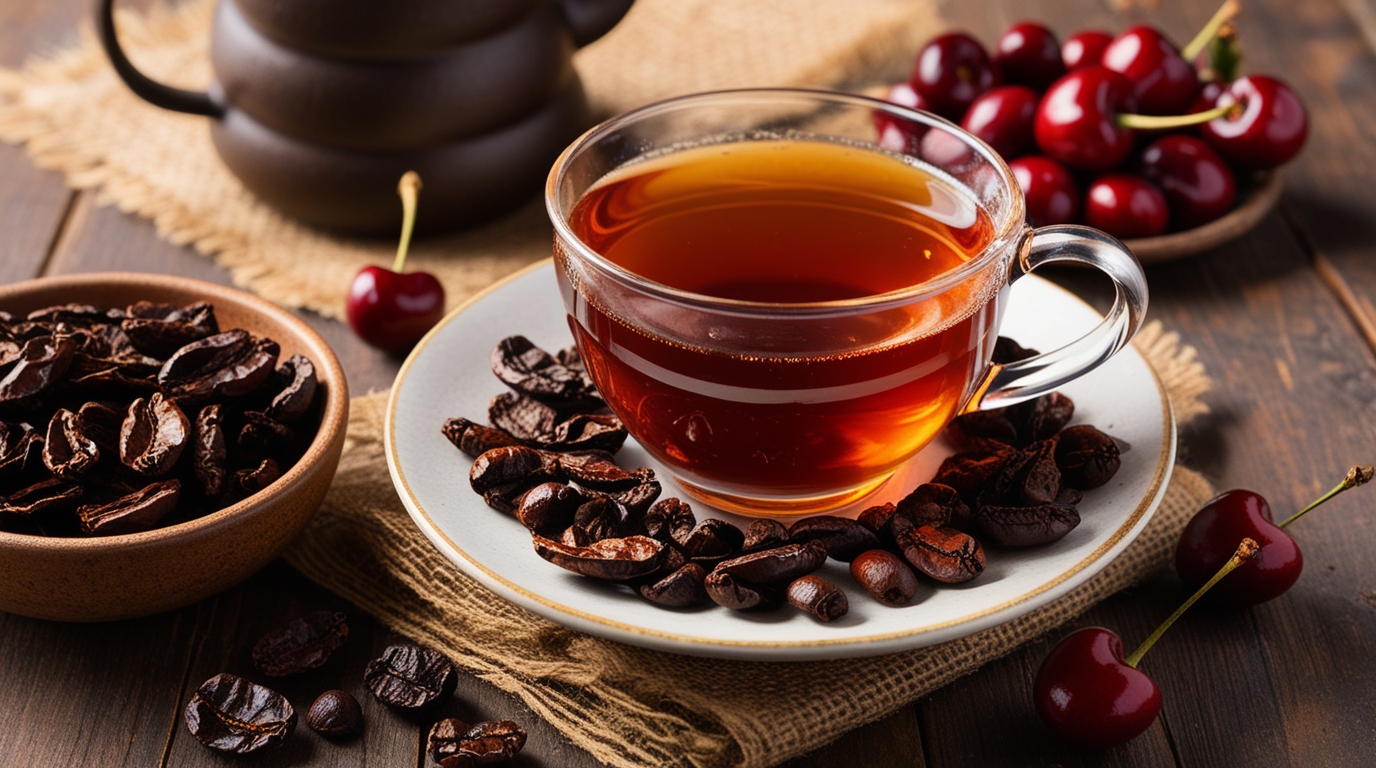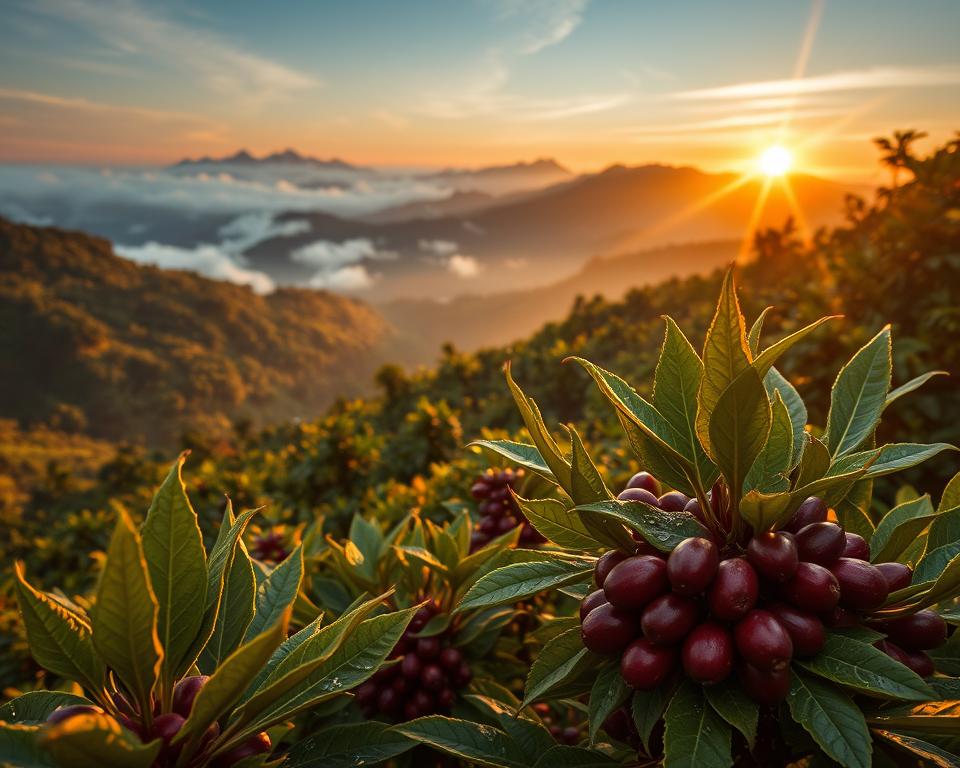Have you ever wondered what happens to the coffee cherry skins after your favorite beans are harvested? Surprisingly, this so-called coffee by-product is more valuable than you might think. Cascara, often known as ‘coffee cherry tea,’ is gaining attention as a delicious and antioxidant-rich superfood.
Discovered within the coffee plant, cascara transforms what was once waste into a delightful beverage.
It’s fascinating how the coffee industry is evolving, with cascara leading the way in sustainability and flavor. Are you curious to learn more about its taste, cultural importance, and rising popularity?
Read on to uncover the secrets of this remarkable brew!
Introduction to Cascara
Have you ever wondered if there’s an alternative to your daily tea or coffee? Enter Cascara—a beverage made from the dried skins of the coffee cherry.
Unlike traditional coffee beans, the outer layer of the coffee cherry offers a naturally sweet and subtly caffeinated drink.
Cascara benefits are numerous and fascinating. It provides a natural caffeine source, ideal for those who need a gentle morning wake-up. With its complex flavor profile that includes notes of fruit and honey, it’s gaining popularity among health-conscious consumers who seek natural and flavorful tea alternatives.
In addition to these Cascara benefits, the method of preparation is quite simple. All you need is some dried coffee cherry, hot water, and a few minutes to steep. It’s that easy. And it makes for a refreshing change from the usual.

The appeal of cascara doesn’t just stop at its taste and caffeine content. It’s a sustainable choice, too. By using the coffee cherry, we reduce waste from coffee production.
For some top-notch quality cascara, Tanzania offers a unique option. You’ll find it to be of premium quality, rich in heritage, and crafted with care. To dive deeper into sustainable coffee choices, check out this link about Tanzanian peaberry coffee.
The Origins of Cascara
Cascara holds a rich history tracing back to the ancient coffee cultivations in Yemen and Ethiopia. These regions are celebrated for their deep connection with the early days of coffee and cascara became an integral part of this legacy.
Where Does Cascara Come From?
The cascara’s origin can be pinpointed mainly to coffee-producing countries like Yemen and Ethiopia. These areas have been cultivating coffee cherries for centuries.
The locals traditionally brewed cascara as a refreshing, energizing tea, appreciating its unique flavor and stimulating effects.
Historical Uses of Cassia
The coffee cherry history reveals that cascara was often utilized in traditional beverages. While coffee beans took the spotlight globally, cascara maintained its importance locally.
It provided a sustainable and delicious use for the whole coffee cherry, reducing waste and delivering a rich, fruity brew. Today, the beverage is being rediscovered and celebrated for its distinct taste and cultural significance.
Cascara Coffee Cherry Tea
Brewing cascara coffee cherry tea transforms your morning routine into an eco-friendly ritual. It’s similar to making loose-leaf tea and requires minimal effort.
First, gather your cascara and a teapot or French press. The process is simple, yet the results are dazzling.
- Measure out the cascara. Use about 5 grams of coffee cherry beverage for every 8 oz of water.
- Heat the water just below boiling, around 200°F. This preserves the delicate flavors of the cascara.
- Add the cascara to your teapot or French press.
- Pour the hot water over the cascara and let it steep for 5-7 minutes, depending on your preference for strength.
- Strain the tea into your favorite mug and enjoy!
One thing I love about brewing cascara is its contribution to sustainable coffee consumption. It utilizes the coffee cherry skin, reducing waste in coffee production. This means you’re not just enjoying a delicious tea but also supporting eco-friendly practices in the coffee industry.
Now, doesn’t a cup of cascara coffee cherry beverage sound appealing? Try it, and you might find it becoming a staple in your daily routine.
Benefits of Drinking Cassia
Drinking Cascara offers numerous advantages. From promoting your overall health to supporting sustainable agriculture, every sip delivers benefits that go beyond taste.
Health Benefits
The Cascara health benefits are extensive. Cascara is rich in antioxidants, which help combat oxidative stress and boost your immune system. With a regular mug of Cascara tea, you can support your heart health, improve digestion, and even boost your energy levels.
By incorporating it into your daily routine, you’re giving your body a valuable dose of nutrients that contribute significantly to your overall well-being.
Sustainability
When we talk about sustainability, cascara shines. It plays a vital role in sustainable agriculture by promoting a zero-waste approach in coffee farming.
Using the coffee cherry pulp that would typically be discarded, cascara not only reduces waste but also creates an eco-friendly product that supports the environment.
Moreover, it helps coffee producers generate additional revenue streams, making the practice more sustainable economically as well.
Choosing Cascara means you’re sipping on a beverage that’s not just good for you but also for the planet.
Does Drinking Cascara Tea Have Any Impact on Heart Health?
Drinking Cascara tea may offer heart health benefits, as it contains antioxidants that can support cardiovascular function. While studies are limited, some research looks into the connection between coffee and heart health, leading to speculation about the potential protective effects of its non-caffeinated counterpart, Cascara, on the heart.
Conclusion
Exploring cascara reveals so much more than just a coffee industry by-product. It’s a delightful beverage with deep cultural roots and health benefits. As someone who enjoys embracing healthier habits, I’m excited about the sustainability aspects it brings to my life.
Cascara tea offers a shift towards an eco-friendly and health-conscious lifestyle. It’s incredible to think that something once discarded now provides a flavorful alternative to traditional drinks. With its blend of sweet, tangy flavors, cascara tea truly stands out in the world of natural beverages.
So, whether you’re looking to switch up your tea routine, support sustainable practices, or simply try something new, cascara is a fantastic option. As more people learn about its benefits and unique taste, I believe it’ll become a beloved staple in many households.
Given its rich history and potential, cascara tea certainly deserves a place in our cups.
FAQ
What is Cascara?
Cascara, often dubbed ‘coffee cherry tea,’ is a unique beverage crafted from the dried skins of coffee cherries. Following the harvesting of coffee beans, these husks are traditionally regarded as a by-product but have recently gained attention as a flavorful and antioxidant-rich superfood.
How does cascara taste?
Cascara offers a complex flavor profile, including notes of fruit and honey, making it a surprisingly delightful drink. It’s naturally sweet and has a subtle caffeine kick compared to traditional tea or coffee.
Where does Cascara come from?
Cascara originates from coffee-producing countries, primarily in places such as Yemen and Ethiopia. It has been consumed for centuries in these regions, traditionally valued for its unique taste and energizing properties.
What are the health benefits of cascara?
Drinking cascara is rich in antioxidants and nutrients that support overall well-being. Regular consumption may contribute to heart health, digestion, and energy levels, making it a beneficial addition to a health-conscious lifestyle.
How do I brew Cascara coffee cherry tea?
Brewing cascara is similar to making loose-leaf tea. Simply steep the dried coffee cherry skins in hot water for about 5-7 minutes. You can adjust the brewing time to achieve your desired strength and flavor.
Is Cascara an eco-friendly option?
Yes, Cascara promotes sustainable coffee consumption by reducing waste in coffee production. Utilizing the coffee cherry skin helps create additional revenue streams for coffee producers and supports zero-waste practices in farming.
Why is cascara considered a superfood?
Cascara is packed with antioxidants and nutrients, contributing to its status as a superfood. It offers numerous health benefits, including potential improvements in heart health, digestion, and overall energy levels.
Can cascara be used as an alternative to tea and coffee?
Absolutely! Cascara is a great alternative to traditional tea and coffee. It provides a milder caffeine content and a unique, sweet flavor, making it a refreshing choice for those looking for something different.
What is the cultural significance of Cascara?
Cascara has traditionally been an integral part of the coffee harvest in places like Yemen and Ethiopia. Despite being overshadowed by coffee beans, its reemergence as a beverage in its own right highlights its cultural and historical importance.




